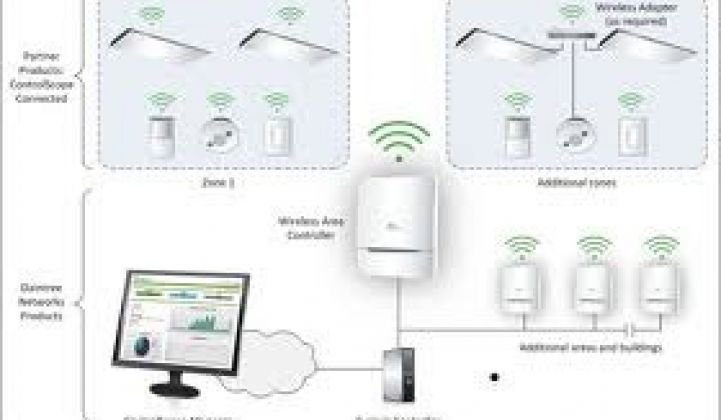Networked lighting startup Daintree Networks just got a big partner to push its technology into the market. That’s Sylvania Lighting Services, the installation affiliate of lighting giant Osram Sylvania, which announced Tuesday that it will “design, install, commission and support” Daintree’s technology in its projects, starting with a whopping 320,000-square-foot deployment for a first, unnamed, customer.
It’s a big vote of confidence for the Mountain View, Calif.-based startup’s hardware and software, which competes against the likes of Adura, Enlighted, Redwood Systems, Lumenergi, Easylite, Lutron Electronics, Echoflex Solutions and Universal Lighting Technologies in the “smart lighting” field. The project announced Thursday could well put Daintree and SLS ahead of their competitors in square footage terms, according to our best estimates.
Now all the partners have to do is prove their technology works. Only about 7 percent of today’s buildings network their lights for energy savings, opening a wide-open market for technologies that can prove a fast efficiency payback for the cost of deployment. What’s limiting growth is proof that the technology actually saves money and delivers ongoing value as promised, making commercial-scale deployments an important measure to watch.
Daintree and SLS are aiming at offices, warehouses, campuses, and multi-facility retail locations for their joint lighting solution. They’re also promising to host the service remotely, presumably via a cloud-based platform running Daintree’s ControlScope software. That’s an important feature for anyone who owns more than one building, and we’re seeing plenty of building energy-efficiency giants shift attention to the hosted IT behind their multi-billion-dollar energy services (ESCO) projects.
Lights take up about 30 percent of a typical office building’s energy, and they’re expensive to control via wired solutions. Going wireless lowers cost per unit dramatically, as long as the wireless network holds up. Then it’s up to the software behind the platform to measure, analyze and control those lights to actually save energy without messing with the building’s operations -- for example, making sure safety stairwell lighting is always on despite power-down commands.
Once the lights are networked, that lays the groundwork for adding more stuff, such as occupancy, temperature, humidity and air quality sensors, or automatic on and off switches for cubicle power supplies and the like. Daintree’s existing list of partners includes Cree, Albeo, Easylite, and Philips company Crescent Stonco, as well as partners like CentraLite, which makes occupancy sensors and plug controllers, that could extend the platform’s scope beyond lights.
Daintree has stood out against its competition by promising to base its light fixture network on the low-power wireless ZigBee protocol, where most competitors have built at least partly proprietary solutions. It’s a testament to the company’s 2003 founding as a maker of software and hardware to test other companies' ZigBee technology. Tuesday’s announcement didn’t specify ZigBee for its current or future deployments with SLS, however.
Daintree raised $8 million in 2010 from Lend Lease and $4 million in venture capital debt financing in 2011, and has offices in Silicon Valley and Melbourne, Australia.



